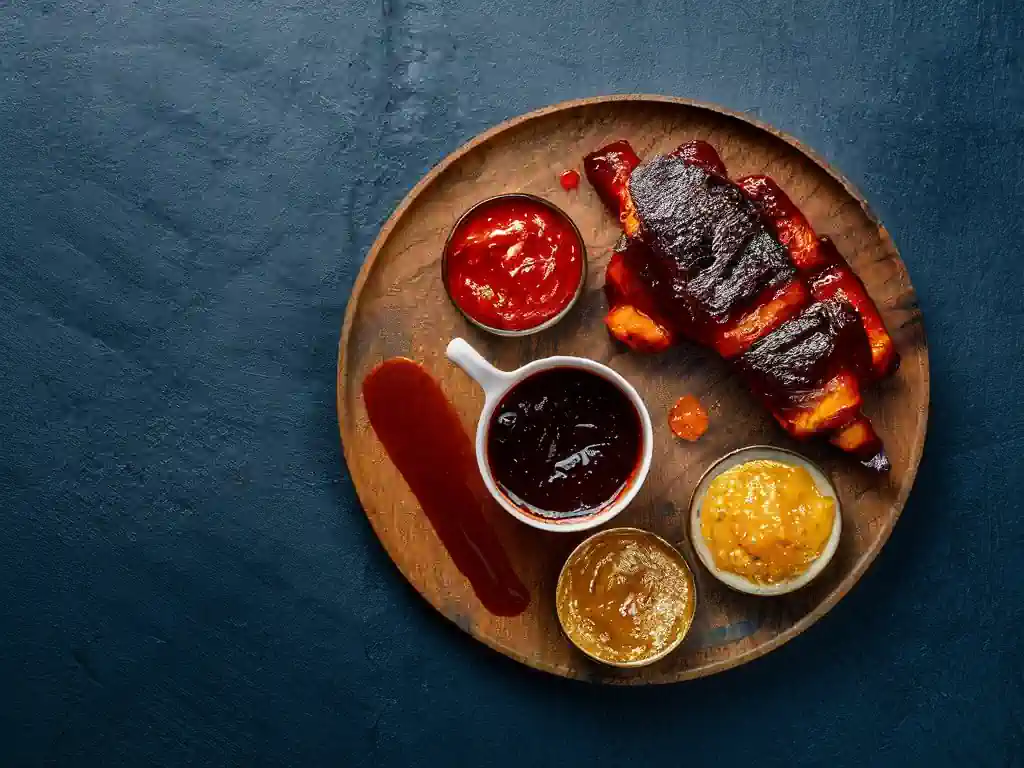Have you ever wondered if you have a BBQ sauce allergies? That might actually be true! Imagine it’s Summer, the sizzling aroma of smokey barbecue fills the air, a symphony of smoky sweetness promising a delicious feast. But for some, that tangy barbecue sauce lurking on ribs or wings can trigger an unwelcome reaction, transforming a joyful gathering into a medical emergency. This article offers comprehensive information on BBQ sauce allergies, exploring the prevalence of food allergies, the complexities of these reactions in relation to BBQ sauce ingredients, and practical strategies for managing a BBQ sauce allergy while still enjoying the vibrant flavors of grilled food.
What is BBQ Sauce?
BBQ sauce is a culinary chameleon, taking on countless regional variations across the United States. Its history can be traced back to indigenous cooking methods in the Caribbean, where meats were seasoned with fiery peppers and acidic fruits. Today, BBQ sauce embodies the rich diversity of American flavors, boasting a spectrum of sweet, smoky, tangy, and spicy profiles.
A Breakdown of Common BBQ Sauce Ingredients:
- Tomato Products: Ketchup, tomato paste, or pureed tomatoes often form the base, providing a touch of sweetness and acidity.
- Sweeteners: Sugar, molasses, or honey add depth and balance the tanginess of vinegar.
- Spices: Chili powder, paprika, cayenne pepper, and a variety of other spices contribute heat, smokiness, and complexity.
- Vinegars: Apple cider vinegar or white vinegar add a sharp brightness and enhance the overall flavor profile.
- Other Ingredients: Mustard, Worcestershire sauce, smoke flavorings, and even fruit purees can be incorporated for unique twists.
The Growing Concern of Food Allergies:
Food allergies are on the rise, particularly among children. According to the Centers for Disease Control and Prevention (CDC), roughly 8% of children under the age of 18 in the United States have a food allergy. This translates to millions of individuals who must navigate a world filled with potential triggers, and BBQ sauce, with its diverse ingredients, can be a hidden culprit.
Understanding the Difference:
It’s crucial to distinguish between food allergies and intolerances. Food allergies involve the immune system’s overreaction to a specific protein in a food, triggering an inflammatory response. Intolerances, on the other hand, cause digestive discomfort due to difficulties processing certain components like lactose in dairy products. The symptoms of an allergy tend to be more severe and can come on quickly, while intolerance symptoms are typically milder and delayed.
Understanding BBQ Sauce Allergies

BBQ sauce, with its rich array of flavors, can also harbor a variety of potential allergens. Let’s delve deeper into some common BBQ sauce ingredients and explore the allergic reactions they might trigger:
- Tomato Allergy: While less common than allergies to other ingredients, some individuals may experience reactions to tomatoes. Symptoms can range from mild (itching, hives) to severe (anaphylaxis, a life-threatening reaction requiring immediate medical attention).
- Soy Allergy: Soy can be a sneaky culprit in BBQ sauce, lurking in ingredients like soy sauce or Worcestershire sauce. Reactions to soy can manifest as skin rashes, swelling, nausea, or even wheezing.
- Tree Nut Allergy: While BBQ sauce recipes don’t typically incorporate nuts as primary ingredients, the possibility of nut-based flavorings or cross-contamination during manufacturing exists. Individuals with tree nut allergies must be vigilant and scrutinize labels carefully.
- Gluten Allergy: For those with celiac disease or gluten sensitivity, some commercially produced BBQ sauces might contain gluten derived from barley or wheat thickeners. Opting for gluten-free certified brands or homemade options eliminates this risk.
- Sulfite Allergy: Sulfites, sometimes used as preservatives in BBQ sauce, can trigger reactions in sensitive individuals. Symptoms can include headaches, cramps, and difficulty breathing. Look for “sulfite-free” labels or homemade alternatives.
- Spice Allergies: While less frequent, allergies to specific spices commonly found in BBQ sauce, like chili powder or paprika, can occur. Symptoms can mimic a general allergic reaction, including hives, itching, and swelling around the mouth.
Beyond the Plate: The Spectrum of Symptoms:
A BBQ sauce allergy can manifest in various ways, ranging from immediate and alarming to delayed and subtle. Let’s explore the spectrum of symptoms to be aware of:
- Immediate Reactions: These occur within minutes of exposure and can be life-threatening. Symptoms include skin rash, hives, swelling of the face, lips, or throat, difficulty breathing, and anaphylaxis.
- Delayed Reactions: These can take hours or even days to appear. Common signs include eczema, diarrhea, stomach cramps, vomiting, and headaches.
Diagnosing a BBQ Sauce Allergy: Unveiling the Culprit:
If you suspect a BBQ sauce allergy, consulting an allergist is crucial. Here’s what you can expect:
- Consultation: A thorough discussion of your medical history, symptoms, and potential triggers will take place.
- Skin Prick Test: This common test involves placing small amounts of suspected allergens on the skin and pricking the area to see if a reaction occurs.
- Blood Test: While less common, blood tests can be used to identify specific allergies by measuring the immune system’s response to allergens.
- Food Challenge (Under Medical Supervision): In some cases, a controlled food challenge involving ingesting small amounts of the suspected allergen may be necessary to confirm the diagnosis.
Living with a BBQ Sauce Allergy: Embracing Flavor Without Fear

A BBQ sauce allergy doesn’t have to limit your enjoyment of delicious food. Here are some practical tips to navigate your culinary journey:
- Become a Label Detective: Reading food labels meticulously is essential. Look for the “Big 8” allergens (milk, eggs, peanuts, tree nuts, soy, wheat, fish, shellfish) listed prominently. Be cautious of generic terms like “spices” and investigate further if necessary.
- Embrace the Power of Communication: When dining out, inform waitstaff about your allergies. Don’t hesitate to ask questions about ingredients, and choose restaurants with allergen transparency initiatives.
- Carry an Emergency Weapon: The Epinephrine Auto-Injector: For individuals with severe allergies and a risk of anaphylaxis, carrying an epinephrine auto-injector is crucial. This life-saving device injects a dose of epinephrine to counteract allergic reactions. Ensure you understand proper injection technique and seek immediate medical attention after using an auto-injector.
- Explore the World of Safe Alternatives: The good news is, you don’t have to forgo the smoky and tangy goodness of BBQ flavor! Here are some options:
- Allergy-Friendly Brands: Several companies offer delicious BBQ sauces formulated to be free of common allergens like soy, gluten, and nuts. Look for certifications from reputable organizations like Food Allergy Research & Education (FARE).
- DIY Delight: The Art of Homemade BBQ Sauce: Take control of your ingredients by whipping up homemade BBQ sauce. This allows you to customize the flavor profile and ensure all ingredients are safe for you. There’s a wealth of online recipes catering to various dietary needs.
The Emotional and Social Impact: Beyond Physical Reactions
Living with a food allergy, particularly one as seemingly ubiquitous as a BBQ sauce allergy, can have a significant emotional and social impact. Here’s what you might face:
- Anxiety and Isolation: The fear of accidental exposure and the potential for severe reactions can lead to anxiety, especially in social settings where food is a central component.
- Difficulties with Shared Meals: Enjoying meals with friends and family can become a source of stress, as you might feel limited in your options or require extra preparation.
- Frustration with Limited Choices: Eating out can be particularly challenging, with limited allergy-friendly options on menus. This can lead to feelings of frustration and exclusion.
Coping Strategies: Embracing Resilience
Fortunately, there are ways to manage the emotional and social challenges associated with a BBQ sauce allergy. Here are some coping strategies:
- Build a Support Network: Surround yourself with understanding friends and family members who are willing to accommodate your dietary needs.
- Advocate for Yourself: Don’t be afraid to speak up about your allergies. Communicate your needs clearly and politely when dining out or attending social gatherings.
- Find Joy in Safe Exploration: There’s a whole world of delicious food waiting to be explored! Experiment with safe recipes, discover hidden gems on allergy-friendly restaurant menus, and celebrate the joy of flavorful alternatives.
- Connect with Online Communities: Join online communities for individuals with food allergies. Share experiences, find support, and gain valuable tips from others who understand your challenges.
- Seek Professional Help: If the emotional impact of your allergy becomes overwhelming, consider seeking support from a therapist or counselor. They can equip you with strategies for managing anxiety and maintaining a positive outlook.
Why Do I Suffer From BBQ Sauce Allergies?
Before delving into the specifics of BBQ sauce allergies, let’s gain a basic understanding of the immune system, our body’s tireless defender against pathogens. The immune system comprises a complex network of cells and proteins working together to identify and eliminate threats like bacteria, viruses, and parasites. When functioning normally, it differentiates between harmless substances and actual invaders. However, in individuals with allergies, this intricate system malfunctions, mistaking harmless food proteins for dangerous enemies.
How BBQ Sauce Allergies Happen
In a BBQ sauce allergy, the culprit lies in specific proteins found within the sauce ingredients. Here’s how an allergic reaction unfolds:
- Exposure: When you consume BBQ sauce containing an allergen, the protein molecules enter your digestive system.
- Misidentification: Your immune system mistakenly identifies the allergen protein as a threat.
- Antibody Production: Specialized immune cells called B-lymphocytes are activated and produce antibodies specifically designed to target the perceived invader (the allergen protein).
- Sensitization: This initial exposure “sensitizes” your immune system to the allergen. Antibodies specific to the allergen now circulate in your bloodstream, lying in wait.
- The Inflammatory Cascade: Upon subsequent exposure to the allergen, the pre-existing antibodies latch onto the allergen protein. This triggers the release of inflammatory chemicals like histamine from immune cells called mast cells.
- Allergic Symptoms: Histamine and other inflammatory mediators wreak havoc on various tissues, leading to the diverse symptoms associated with an allergic reaction.
The Culprits in BBQ Sauce Allergies
Now that we understand the general mechanics of an allergic reaction, let’s revisit some common BBQ sauce ingredients and explore the science behind allergies to them:
- Tomato Allergy: Allergies to tomatoes, though less prevalent, can trigger reactions. The culprit proteins can be profilin (a protein found in various plant foods) or Solanum lycopersicum allergens (specific to tomatoes). Symptoms can range from mild oral allergy syndrome (itching, tingling in the mouth) to full-blown allergic reactions.
- Soy Allergy: Soybeans harbor various allergenic proteins, including glycinin and beta-conglycinin. These proteins can lurk in unsuspecting places like soy sauce or Worcestershire sauce, common ingredients in BBQ sauce. Reactions to soy can manifest as skin rashes, swelling, digestive issues, and even respiratory problems.
- Tree Nut Allergy: While BBQ sauce recipes don’t typically incorporate nuts as primary ingredients, the possibility of trace amounts due to cross-contamination during manufacturing or nut-based flavorings exists. Allergies to tree nuts like almonds, cashews, or walnuts involve specific protein triggers that can cause severe reactions upon even minimal exposure.
Beyond the Obvious: Allergies to Spices
Spices, while generally considered safe, can trigger allergic reactions in some individuals. The culprits here can be various protein components within the spice itself. For example, paprika allergies can be linked to a protein called capsicum sensitizing protein. Symptoms associated with spice allergies can mimic a general allergic reaction.
Genetics and the Environment: A Complex Dance
While the exact causes of food allergies remain under investigation, both genetics and environmental factors are believed to play a role:
- Genetics: If a close family member has a food allergy, you’re more likely to develop one yourself. Genes influence how your immune system reacts to foreign substances.
- The Hygiene Hypothesis: This theory suggests that early childhood exposure to a wider variety of microbes might help train the immune system and reduce the risk of allergies. Conversely, overly sanitized environments might contribute to the rise of allergies in developed countries.
Managing a BBQ Sauce Allergy
Avoiding the Triggers: Safeguarding Your Health
Living with a BBQ sauce allergy requires proactive management strategies to minimize exposure to potential allergens. Here are some key tactics:
- Become a Label-Reading Master: This might seem tedious, but it’s your first line of defense. Develop the habit of meticulously scrutinizing food labels, paying close attention to the “Big 8” allergens (milk, eggs, peanuts, tree nuts, soy, wheat, fish, shellfish) listed prominently. Be cautious of generic terms like “spices” or “natural flavors” and investigate further if necessary. Many companies offer online allergen information for their products – utilize these resources!
- Embrace the Power of “Ask”: When dining out, don’t be shy about asking questions. Inform waitstaff about your allergies and inquire about the ingredients in menu items, particularly sauces and marinades. Don’t hesitate to ask for ingredient lists or speak directly with the chef if needed.
- Building a Safe Haven: Your Kitchen Embrace the joy of homemade BBQ sauce! Taking control of the ingredients allows you to customize flavor profiles and eliminate potential allergens. Research online recipes catering to specific dietary needs. Explore substitutes – there are fantastic alternatives for common allergens like soy sauce (coconut aminos) or wheat thickeners (arrowroot powder).
Living with BBQ Sauce Allergy: Beyond Avoidance
While avoiding allergens is crucial, there’s more to managing a BBQ sauce allergy. Here are some strategies to navigate social situations and enhance your overall well-being:
- Carry Your Shield: The Epinephrine Auto-Injector (for Severe Allergies): For individuals with severe allergies and a risk of anaphylaxis, carrying an epinephrine auto-injector is a life-saving necessity. Ensure you understand proper injection technique and the importance of seeking immediate medical attention after using an auto-injector. Regularly check the expiration date and replace your auto-injector as needed.
- Communicate Clearly, Advocate for Yourself: Don’t be afraid to speak up about your allergies. Explain your dietary needs politely but firmly during social gatherings or potlucks. Offer to bring a safe dish to share, or suggest restaurants with allergy-friendly menu options.
- Plan Ahead, Pack Safe Snacks: When attending events where food options might be limited, pack safe snacks you can rely on to avoid feeling excluded or hungry. This empowers you to participate fully while ensuring your dietary needs are met.
Strategies for Coping
A BBQ sauce allergy can have a significant emotional impact, leading to feelings of anxiety, isolation, and frustration. Here are some strategies for coping:
- Build a Support System: Surround yourself with understanding friends and family who are willing to accommodate your needs. Share your challenges and experiences openly.
- Embrace Self-Advocacy: Don’t let your allergy define you. Learn as much as possible about your condition and advocate for yourself in all situations. The more empowered you feel, the less daunting managing your allergy will become.
- Find Joy in Safe Exploration: The world of food is vast and delicious, even with a BBQ sauce allergy. Explore safe recipes, discover hidden gems on allergy-friendly restaurant menus, and celebrate the joy of flavorful alternatives. There’s a whole culinary adventure waiting to be savored!
- Connect with Your Tribe: Online Communities for Support: Join online communities and groups to connect with others who suffer from the same allergen and understand your challenges. Share experiences, find tips and tricks, and gain valuable support from a virtual community.
- Seek Professional Help: If the emotional impact of your allergy becomes overwhelming, consider seeking counseling or therapy. A therapist can equip you with strategies for managing anxiety, maintaining a positive outlook, and developing healthy coping mechanisms.
Conclusion
This article has delved into the complexities of BBQ sauce allergies, exploring the prevalence of food allergies, the science behind allergic reactions to specific BBQ sauce ingredients, and practical strategies for managing this condition. We’ve discussed the importance of identifying potential allergens, navigating social situations with confidence, and developing coping mechanisms for the emotional challenges associated with a BBQ sauce allergy.
Living a Fulfilling Life with a BBQ Sauce Allergy: It’s Possible!
A BBQ sauce allergy doesn’t have to limit your enjoyment of food and social interactions. By embracing proactive management strategies, advocating for yourself, and building a strong support network, you can navigate your culinary journey with confidence and discover a world of delicious possibilities. With a bit of planning and creativity, you can still savor the smoky and tangy flavors you crave, even if it means exploring alternative options or whipping up your own homemade BBQ sauce.
Remember: Knowledge is power. The more you understand your allergy, the better equipped you’ll be to manage it effectively. Don’t be afraid to ask questions, seek professional guidance, and connect with others who share similar experiences. There’s a vibrant community of individuals living with food allergies, and you’re not alone in this journey.
A Final Note: A World of Flavor Awaits
While BBQ sauce might hold certain challenges for those with allergies, the world of food remains an exciting and vibrant landscape. Embrace this as an opportunity to explore new flavors, discover hidden culinary gems, and celebrate the joy of safe and delicious alternatives. With a positive outlook and a proactive approach, you can ensure that a BBQ sauce allergy doesn’t prevent you from enjoying the full richness and diversity the culinary world has to offer.
Additional Resources:
- Food Allergy Advocacy Organizations:
- Food Allergy Research & Education (FARE): https://www.foodallergy.org/
- American College of Allergy, Asthma & Immunology (ACAAI): https://acaai.org/
- Online Allergy Communities and Support Groups:
- FARE Teen & Young Adult Network: https://www.foodallergy.org/resources/teen-advisory-group
- Kids With Food Allergies: https://kidswithfoodallergies.org/
- Government Resources:
- National Institute of Allergy and Infectious Diseases (NIAID): https://www.niaid.nih.gov/diseases-conditions/food-allergy
- Food and Drug Administration (FDA): https://www.fda.gov/food/food-labeling-nutrition/food-allergies
A Final Word from The Author:
We hope this comprehensive exploration of BBQ sauce allergies has empowered you with valuable information and practical tools for navigating this condition. Remember, a BBQ sauce allergy doesn’t define you. Embrace the vibrant world of safe and delicious food options, and embark on a culinary adventure filled with flavor and joy!pen_spark



